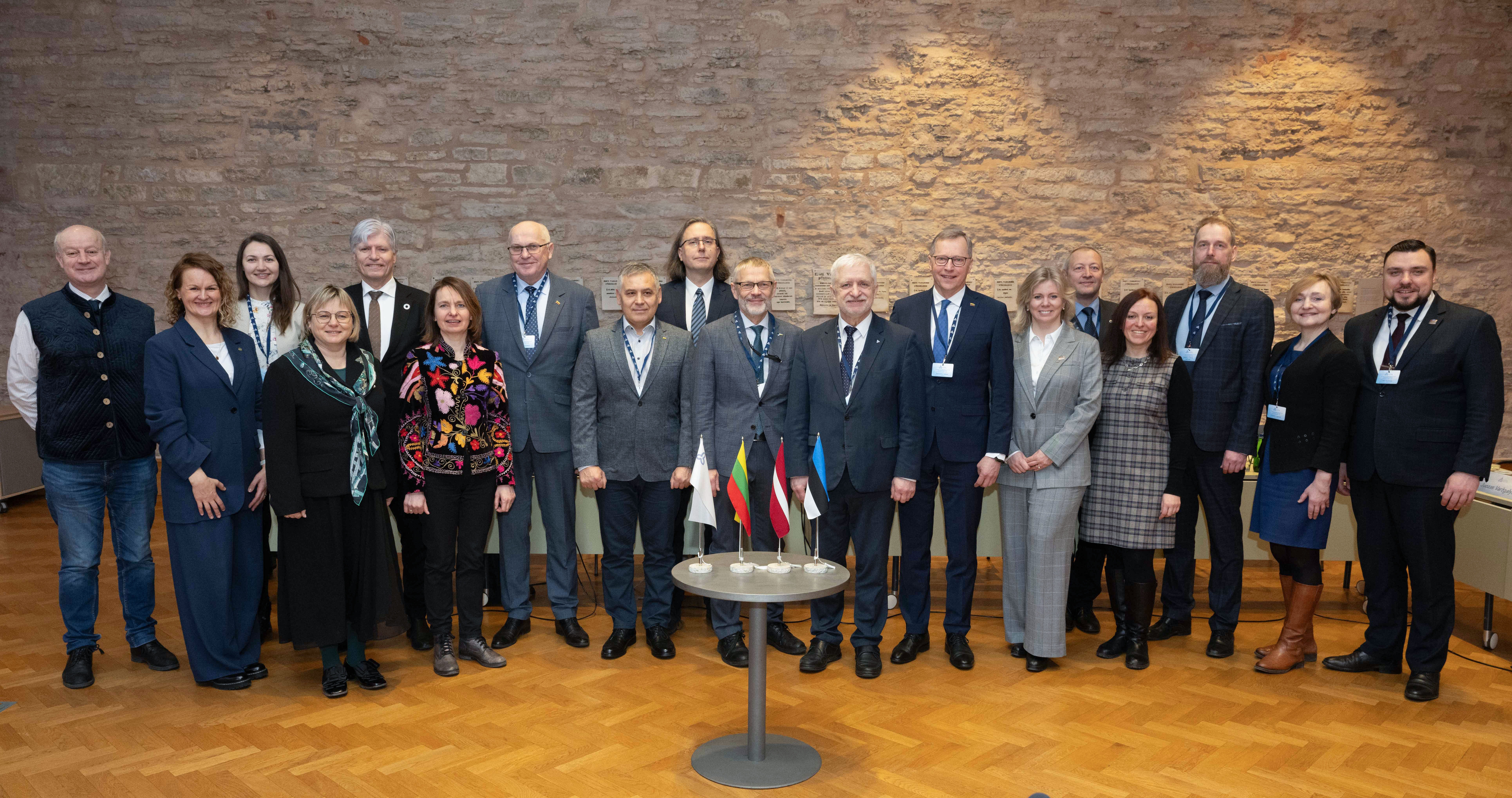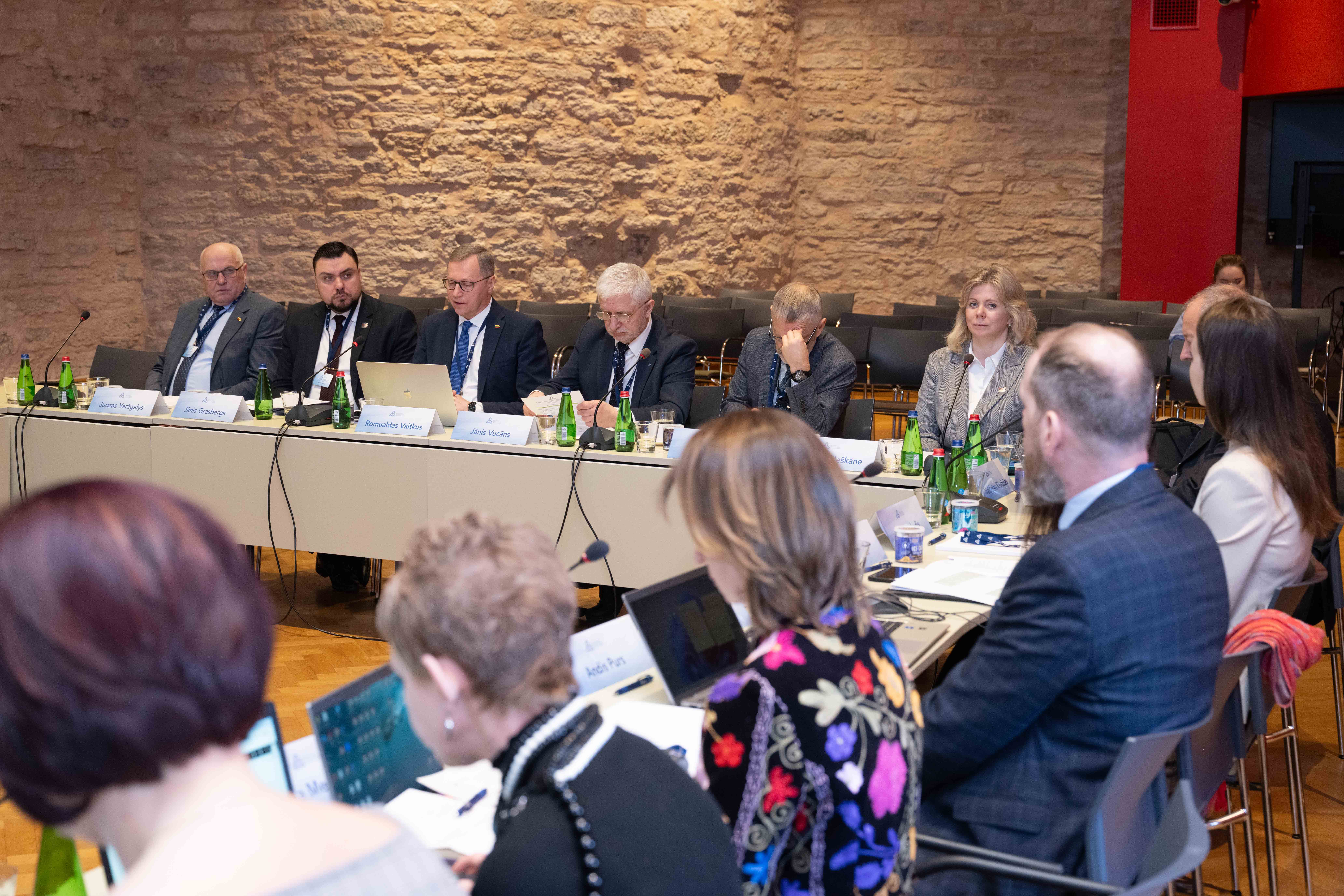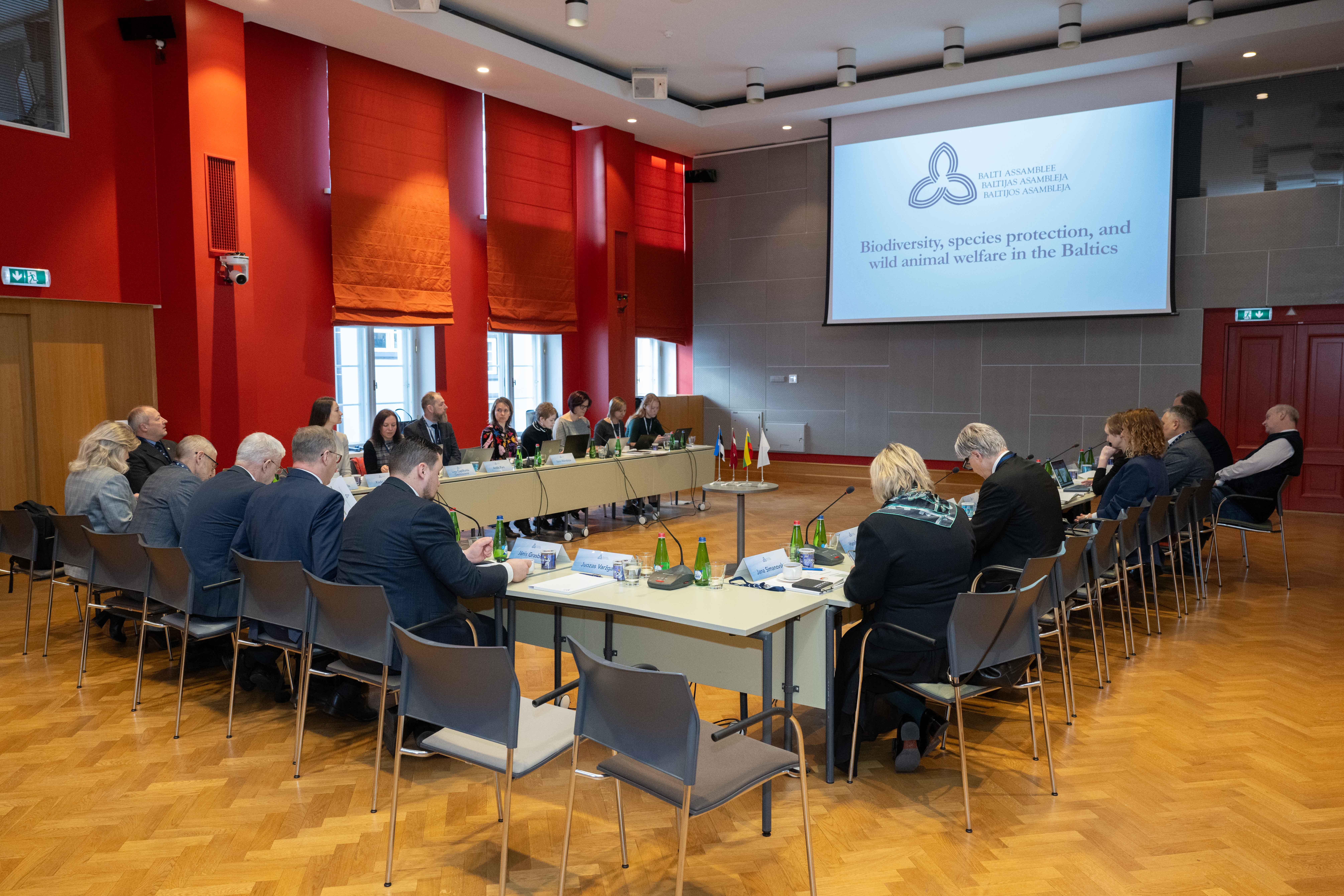Dissimination
MULTIPLIER EVENT/ FINAL CONFERENCE September 24th–25th , 2024 Higher Agronomic Institute of Chott-Mariem, ISA-CM, University of Sousse, Tunisia





On the 18th September 2024 a LIVECLIC confrence was organised at Olustvere Vocational College (Olustvere Teenindus- ja Maamajanduskool) in Estonia



INTERNATIONAL TRAINING ‘LIVESTOCK PRODUCTION AND CLIMATE CHANGE’



Estonian Workshop Mitigation of Climate Change 21st February 2024 international students came to visit the Estonian University of Life Sciences
Estonian Workshop Mitigation of Climate Change
21st February 2024 international students came to visit the Estonian University of Life Sciences




Parliamentarians highlight the need for joint solutions for the protection of biodiversity and animal welfare On 1-2 February 2024, the meeting of the Natural Resources and Environment Committee of the Baltic Assembly took place in Tallinn, Estonia.
Parliamentarians highlight the need for joint solutions for the protection of biodiversity and animal welfare
On 1-2 February 2024, the meeting of the Natural Resources and Environment Committee of the Baltic Assembly took place in Tallinn, Estonia.
During the first session of the meeting, parliamentarians, government representatives and experts discussed biodiversity, species protection, and wild animal welfare in the Baltic States. Chair of the Natural Resources and Environment Committee of the Baltic Assembly Romualdas Vaitkus emphasised that biodiversity is essential to human development and protecting nature. Biodiversity protection also includes the welfare of wild animals, like their health and natural living. “For this reason, several countries have recently banned or restricted wild animals in circuses, including all the Baltic States,” he stated.
Chief Veterinarian-Deputy Director of the Lithuanian Sea Museum Žilvinas Kleiva introduced the participants to the work of the Baltic Sea Animal Rehabilitation Centre which is located in Klaipeda, Lithuania, and cares for seals and other marine animals. The most important activities of the centre also include education, monitoring and research. Afterwards, the government representatives informed about the level of protection of biodiversity in each country. Experts and parliamentarians concluded that the Baltic States are cooperating to ensure the welfare of all kinds of species – this includes the exchange of information and good practices at various levels, having common positions in EU and international negotiations, as well as the organization of expert workshops and other meetings. At the same time, cooperation could be enhanced through the implementation of the EU Birds and Habitats directives, EU Biodiversity Strategy 2030, as well as on migratory species (such as birds and large carnivores).
During the second session of the meeting, Chair of the Natural Resources and Environment Committee Romualdas Vaitkus emphasized that animal welfare is important not just for protecting climate and biodiversity, but also for ensuring food safety as increasing animal welfare standards is important as it can also reduce the need for antibiotics. Another related topic is the outbreaks of animal diseases, such as African swine fever and bird flu. “Early detection of sick animals and reporting and sharing of information with neighbouring countries are important steps for controlling such epidemics,” he noted.
Member of the Baltic Animal Welfare Network and Professor at the Estonian University of Life Sciences David Arney informed about some of the main instruments for cooperation in the field, such as the Baltic Animal Welfare Network, which brings together animal welfare scientists and other interested parties and encourages them to exchange knowledge and information on animal welfare. Director General of the Food and Veterinary Service of Latvia Māris Balodis stated that in the veterinary services, cooperation between the Baltics takes place daily, for example, in agreeing on common positions. Chief Veterinary Officer at the State Food and Veterinary Service of Lithuania Vaidotas Kiudulas added that as each of the Baltic countries has national databases for registering domestic animals, it would be useful to discuss having a common platform. Lastly, Animal Health and Welfare Adviser at the Food Safety Department at the Ministry of Regional Affairs and Agriculture of Estonia Kadri Kabel informed the Baltic countries should adhere to the one health principle to sustainably balance and optimize the interdependent health of animals, people, and ecosystems to tackle all of the discuss challenges.
Lastly, the parliamentarians discussed harmonising approaches and encouraging joint recycling projects. Adviser at the Circular Economy Department at the Ministry of Climate of Estonia Laurina Šinkejeva informed about the PACKGDEPO project, which raised awareness of packaging deposit and developed a strategic approach to harmonizing packaging deposit systems in the Baltic States. As a result, over 360 participants from Latvia and Estonia attended the project events and more than 85 000 citizens were influenced to separate their waste. Approximately 3054 sessions of returning the packages were done during the pilot period. Three months after the pilot period, packaging with a common barcode formed almost a quarter of all collected packages across two countries. To decide the best implementation scenario for the future, a more detailed analysis needs to be conducted.
Link= https://www.baltasam.org/ba-environment-committee-meeting-2024.



INTERNATIONAL TRAINING ‘LIVESTOCK PRODUCTION AND CLIMATE CHANGE’
Multiplier Event COLDIRETTI Piemonte-INIPA NordOvest - 17 nov. - 15 dic. 2023
Between 17 November and 15 December 2023, CISAO_UNiTO and COLDIRETTI Piemonte organized the MULTIPLIER EVENT "LIVECLIC - Sustainable adaptation of animal production to climate change".
The event, which is part of the initiatives envisaged by the Erasmus+ CBE_VET "LIVECLIC" project, is structured in the form of an "extended event" which includes repeats of the main MULTIPLIER EVENT "LIVECLIC" event at the COLDIRETTI Piedmont provincial offices.
The “LIVECLIC” MULTIPLIER EVENT is aimed at breeders and technicians; the CISAO_UniTo members, Prof. Riccardo Fortina, agronomist, teacher at DISAFA_UniTo, and Prof. Daniele De Meneghi, veterinary doctor, teacher at DSV_UniTo will participate as speakers.


A PROFESSOR FROM ESTONIA
The course of lectures for the Faculty of Agricultural Sciences is conducted by a foreign scientist from Estonia, Professor Arni David Richard of the Estonian University of Natural Sciences.
He spoke in detail about education in Estonia. His lectures are about technologies of milk and beef production, animal biotechnology and zoohygiene on the basis of design of livestock facilities.
- Within a month, I will give lectures to bachelors, masters and doctoral students of animal protection. We are looking at the impact of climate change on fauna and I think this will fit well with the work of my local colleagues.
If we can cooperate, I think it will be great, - noted the professor.
It should be noted that lectures by foreign scientists are a regular practice at ToU. Today, professors from Turkey, Czech Republic, Germany, Montenegro, Croatia, Pakistan, Estonia, Spain, Poland and India have come to the university.
3 g
ЭСТОНИЯДАН КЕЛГЕН ПРОФЕССОР
Ауыл шаруашылығы ғылымдары факультетіне арналған дәрістер курсын Эстониядан келген шетелдік ғалым Эстония жаратылыстану ғылымдары университетінің профессоры Арни Дэвид Ричард жүргізеді.
Ол Эстониядағы білім туралы егжей-тегжейлі айтып берді. Оның дәрістері сүт және сиыр етін өндіру технологиялары, жануарлар биотехнологиясы және мал шаруашылығы объектілерін жобалау негіздеріндегі зоогигиена туралы.
- Бір айдың ішінде мен жануарларды қорғау мамандығының студенттеріне бакалаврлар, магистранттар мен докторанттарға дәріс оқимын. Біз климаттың өзгеруінің фаунаға әсерін қарастырамыз және менің ойымша, бұл менің жергілікті әріптестерімнің қызметімен жақсы үйлеседі.
Егер біз ынтымақтаса алсақ, бұл керемет болады деп ойлаймын, - деп атап өтті профессор.
Айта кетейік, ToU-да шетелдік ғалымдардың дәріс оқуы бұл тұрақты тәжірибе. Бүгінгі таңда университетке Түркия, Чехия, Германия, Черногория, Хорватия, Пәкістан, Эстония, Испания, Польша және Үндістаннан келген профессорлар келді.
3 g

https://www.instagram.com/reel/C0LKZ5xoflU/?utm_source=

https://www.instagram.com/p/C0LNvADov-e/?igshid=MzRlODBiNWFlZA%3D%3D&img_index=1

https://www.instagram.com/p/C0LNbuVoh1B/?igshid=MzRlODBiNWFlZA%3D%3D&img_index=1
International Conference at Toraighyrov University, Pavlodar, Kazakhstan. 24th November 2023
Estonian University Of Life Sciences participated in the International Conference at Toraighyrov University, Pavlodar, Kazakhstan. 24th November 2023.
Prof.David Arney Presenting Liveclic and Animal Welfare






International Exhibition of Thessaloniki, 3-5 February 2023
The Agricultural University of Athens presented the project LIVECLIC - Sustainable Adaptation of Livestock Production to Climate Change and its objectives through the 7th Conference "Meat and its Products" organized by Meat News Magazine during the International Exhibition of Thessaloniki, 3-5 February 2023.

20° Convegno annuale di RARE Guastalla (RE) Palazzo Ducale - 23 Settembre 2023 (9,30 - 13,00)



European foundation SAVE which deals with the protection of European breeds

LIVECLIC presentation at Armenian National Agrarian University.
Estonian University of Life Sciences participated in a meeting at Armenian National Agrarian University
Prof . David Arney presenting LIVECLIC and Animal welfare to students and staff of the Armenian National Agrarian University.


Armenian National Agrarian University website: : https://anau.am/en/%d5%b8%d6%82%d5%a3-%d5%b7%d5%a1%d5%a2%d5%a1%d5%a9-%d5%a1%d5%b6%d5%a1%d5%bd%d5%b6%d5%a1%d5%a2%d5%b8%d6%82%d5%aa%d5%a1%d5%af%d5%a1%d5%b6-%d6%86%d5%a1%d5%af%d5%b8%d6%82%d5%ac%d5%bf%d5%a5%d5%bf/
Progetto Erasmus + CB_VET “CAPACITY BUILDING - VOCATIONAL & EDUCATION TRAINING”

Cooperation project “Objectif Travail” 23rd March 2023.
On 23rd March 2023, the CISAO UniTo team gave a presentation on the Erasmus+ CB-VET “LIVECLIC” at the head-office of Africa70, Italian NGO, Niamey (Niger). This dissemination/ information event was carried out within the framework of training activities on animal feeding, production and health, attended by members of local cooperatives/associations of livestock breeders, partners of a development cooperation project “Objectif Travail” implemented in the peri-urban and rural areas around Niamey
(https://cisvto.org/progetti/fare-impresa-con-i-giovani-nigerini/; https://www.africa70.org/project/obiettivo-lavoro).
The CISAO team provided insights on the main objectives and activities of LIVECLIC project, with special reference to the teaching material being developed on the impact of CC on livestock production and vice-versa, and on the importance of local breeds, resilient and adapted to CC.
The management of the project “Objectif Travail” and the trainees stated that the LIVECLIC training topics/materials developed by LIVECLIC partners would also be of great interest for the cooperatives' members/associations of livestock breeders in Niger, as they face common problems in livestock breeding. They requested to make the LIVECLIC teaching material available -once translated and adapted into French.



Cambiamenti Climatici: nuovo Clima, nuove colture, nuovi allevamenti.

XIX BALTIC ANIMAL BREEDING CONFERENCE DECEMBER 14-15, 2022, TARTU, ESTONIA



More info and registration: https://babc.emu.ee/
Photo exhibition on endangered livestock breeds

Link al sito Due Punti Festival:
https://festivalduepunti.unito.it/
Link alla pagina Facebook del Due Punti Festival:
https://www.facebook.com/duepuntifestival
Link al video della diretta Facebook:
https://www.facebook.com/duepuntifestival/videos/1350846545444421/
19° Convegno annuale di RARE: RARE annual assembly: Environment, climate change and management of cross-border breeds
Sabato 24 settembre 2022 si è tenuto presso il Palazzo Ducale di Guastalla (RE) il 19° convegno annuale dell’associazione RARE dal titolo “Razze di confine”. Durante il convegno – inserito negli appuntamenti del progetto europeo LIVECLIC – è stato dato ampio spazio alle problematiche legate alla conservazione delle razze autoctone e alle loro mutate aree di allevamento a causa anche dei cambiamenti climatici.



https://www.cisao.unito.it/sites/x021/files/fortina_2022_ok.pdf
ECM AgriPiemonteVet, Agriculture, livestock and nature conservation on the Alps facing the climate change
Nell’ambito delle attività del progetto LIVECLIC, l’associazione AGRIPIEMONTEVET in collaborazione con CISAO e Parco Nazionale del Gran Paradiso ha organizzato un corso di Educazione Continua in Medicina (ECM) dal titolo “Sostenibilità nelle aree alpine nell'era dei cambiamenti climatici” che si terrà l’8 luglio 2022 presso il Salone Centro Visitatori del Parco Nazionale Gran Paradiso in Borgata Prese - Ceresole Reale (TO). L’evento è accreditato e si propone di aggiornare i medici veterinari sulle modalità relative all’utilizzo sostenibile delle aree marginali, in termini di produzioni zootecniche e rispetto dell’ambiente.

https://www.cisao.unito.it/sites/x021/files/sostenibilita_2022.pdf


